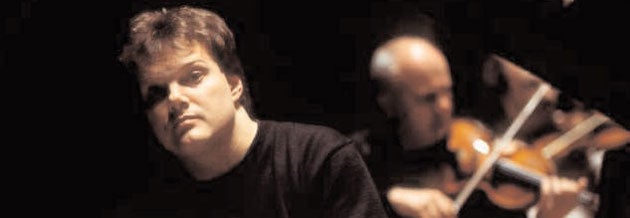Magic touch: German pianist Lars Vogt
Described by Sir Simon Rattle as 'extraordinary', the German pianist Lars Vogt has to be heard to be believed, says Michael Church

Your support helps us to tell the story
From reproductive rights to climate change to Big Tech, The Independent is on the ground when the story is developing. Whether it's investigating the financials of Elon Musk's pro-Trump PAC or producing our latest documentary, 'The A Word', which shines a light on the American women fighting for reproductive rights, we know how important it is to parse out the facts from the messaging.
At such a critical moment in US history, we need reporters on the ground. Your donation allows us to keep sending journalists to speak to both sides of the story.
The Independent is trusted by Americans across the entire political spectrum. And unlike many other quality news outlets, we choose not to lock Americans out of our reporting and analysis with paywalls. We believe quality journalism should be available to everyone, paid for by those who can afford it.
Your support makes all the difference.If you met Lars Vogt at a party, you might think he was a sportsman rather than a pianist. Chunky, amiable and articulate, he seems blissfully free of the neuroses that plague his breed, and he's refreshingly down-to-earth about the perils and pressures of his calling. Yet this German virtuoso is the man whom Sir Simon Rattle has described as "one of the most extraordinary musicians of any age group that I have had the fortune to be associated with".
Anyone wanting to verify this judgement need only listen to the Schubert disc that Vogt released this year. Its centrepiece is the work with which many pianists seek to make their mark: the Sonata in B flat major, Mozart's farewell to life. And with titans such as Alfred Brendel dominating the field, one inevitably starts listening with a dash of scepticism: can this 38-year-old really find something new to say about it? After a few minutes, you realise he emphatically can.
Like most critics, I've heard scores of interpretations of this piece, but Vogt makes it sound like a work I haven't heard before. His reading is exceptionally slow, yet it has powerful momentum: the pauses between the phrases feel like hesitations, yet they're pregnant with pulse. There's a desperate hopelessness about it, which the repeated bass trill reinforces fatefully.
And as he begins to talk about it, the impulse behind his performance becomes clear. Before playing it for the first time in public, he went for advice to the tutor with whom he has studied for the past 20 years. "I played him some passages," says Vogt, "and he almost taunted me for my youth, saying that I clearly still believed in happy endings." Yet Vogt had gone to him thinking that he had already imbued his performance with doom. He now thinks of that bass trill as "the trill of death", which is exactly how he plays it. The funereal second movement finishes in frozen immobility, and even the repeated octave punctuating the final allegro has a new quality. "To me, it sounds like someone who keeps saying 'No'," says Vogt. After this illuminating reading, Schubert's sonata will never sound the same again.
Vogt trots through his musical life-story, which began in Düren, a town near Cologne, with a disarming lack of pretension. It started at the local music school, where, following in the footsteps of his elder brother, he began playing the piano at six with a teacher who kept him steady on his path until he was 16. "She seemed to see potential there, and supported it in every way she could," he says. He didn't practise much, but progressed fast. Winning second place in a regional competition at 12 motivated him to go in for a national one, at which he distinguished himself with Bach, Beethoven, Mendelssohn and Bartok, and a nocturne by Chopin that he now regularly plays as an encore. To show why he loves it so much, he plays it to me – a wistful and quintessentially valedictory utterance. "If I have to choose one little piece to play at the end of my musical life," he says afterwards, "it will be this."
Competitions were what he decided to pace himself with. He went to Moscow to play in the Tchaikovsky Competition – the piano's triennial answer to the Olympics – and, hampered by nerves and the wrong programme, he didn't reach the final. Three months later, he went in for the Leeds competition, and came second. "That did a lot for me – it was the opening to everything that's happened since. But more important than winning a prize was the collaboration with Simon Rattle that arose from it." Rattle was the conductor for the concerto in the final, and since then he has become Vogt's mentor.
He doesn't have an enormous repertoire – a result, he says regretfully, of having done many other things besides practising when young: "Now it takes me much longer to learn a piece." But he's transcendentally good with what he does have at his fingertips: his Schumann pulsates with passion, his Shostakovich broods powerfully, his Brahms is towering and majestic.
In October, Vogt will give a series of concerts at the Wigmore Hall, but in the meantime, you can hear him for yourself by downloading a recording of Vogt and friends playing Mozart's Piano Quintet K452 this month at the Lucerne Festival, free from the Independent website.
Click here to listen to and download Lars Vogt's performance
Lars Vogt's residency at the Wigmore Hall, London W1 (020-7935 2141), begins on 4 October
Join our commenting forum
Join thought-provoking conversations, follow other Independent readers and see their replies
Comments